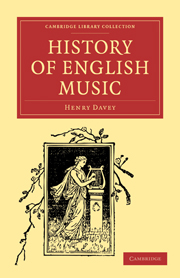Book contents
- Frontmatter
- PREFACE
- Contents
- CHAPTER I BEFORE THE INVENTION OF COMPOSITION
- CHAPTER II THE INVENTION OF POLYPHONY (1400–53)
- CHAPTER III THE PERIOD OF THE INVENTION OF INSTRUMENTAL COMPOSITION (1453–1536)
- CHAPTER IV THE REFORMATION: FROM THE DISSOLUTION OF THE MONASTERIES TO THE DEFEAT OF THE ARMADA (1536–88)
- CHAPTER V THE MADRIGALIAN PERIOD (1588–1630)
- CHAPTER VI THE AGE OF THE DECLAMATORY SONGS, OF THE FANCIES FOR VIOLS, AND OF THE SUPPRESSION OF ECCLESIASTICAL MUSIC (1630–1660)
- CHAPTER VII THE PERIOD OF FOREIGN INFLUENCE, AND OF DRAMATIC MUSIC (1660–1700)
- CHAPTER VIII THE PERIOD OF PATRIOTIC SONGS (1701–1800)
- CHAPTER IX THE NINETEENTH CENTURY
- APPENDIX
- INDEX
CHAPTER VI - THE AGE OF THE DECLAMATORY SONGS, OF THE FANCIES FOR VIOLS, AND OF THE SUPPRESSION OF ECCLESIASTICAL MUSIC (1630–1660)
Published online by Cambridge University Press: 29 August 2010
- Frontmatter
- PREFACE
- Contents
- CHAPTER I BEFORE THE INVENTION OF COMPOSITION
- CHAPTER II THE INVENTION OF POLYPHONY (1400–53)
- CHAPTER III THE PERIOD OF THE INVENTION OF INSTRUMENTAL COMPOSITION (1453–1536)
- CHAPTER IV THE REFORMATION: FROM THE DISSOLUTION OF THE MONASTERIES TO THE DEFEAT OF THE ARMADA (1536–88)
- CHAPTER V THE MADRIGALIAN PERIOD (1588–1630)
- CHAPTER VI THE AGE OF THE DECLAMATORY SONGS, OF THE FANCIES FOR VIOLS, AND OF THE SUPPRESSION OF ECCLESIASTICAL MUSIC (1630–1660)
- CHAPTER VII THE PERIOD OF FOREIGN INFLUENCE, AND OF DRAMATIC MUSIC (1660–1700)
- CHAPTER VIII THE PERIOD OF PATRIOTIC SONGS (1701–1800)
- CHAPTER IX THE NINETEENTH CENTURY
- APPENDIX
- INDEX
Summary
DURING this period the connection of musical history with general English history is more prominent and essential than at any other time; and since it has been more misrepresented than any other, I shall have to discuss the matter somewhat in detail.
In the year 1630 the change which had demolished the Palestrina school in Italy had also been completed in England. In each country secular composition was more cultivated than ecclesiastical, though for different reasons. Opera and the violin absorbed most of the energy of Italian musicians; and Frescobaldi was advancing the organ style. In England attention was mainly occupied by the declamatory Ayres and Dialogues, and the Fancies for viols. There was a temporary recrudescence of ecclesiastical music, which was speedily put down altogether. There was a great decline in music-publishing; but during the Commonwealth it was resumed. The keyboard-execution appears to have somewhat declined from the Elizabethan standard, and before the end of the period both Italy and Germany were superior to England in this respect, though the English did not yet believe it.
The sonnet which Milton addressed to Henry Lawes exactly expresses the merits of the Ayres and Dialogues, which form the principal portion of the vocal music during this period and part of the next. Large collections were published during the Commonwealth and afterwards, showing that they must have been in general favour. Their character cannot be fully appreciated without some knowledge of the contemporary poetry. Poetry and music were at this time most intimately connected, though no longer produced by the same man. The leading musicians and the leading poets were on intimate terms, and the poets continually proclaimed their appreciation.
- Type
- Chapter
- Information
- History of English Music , pp. 246 - 305Publisher: Cambridge University PressPrint publication year: 2009First published in: 1895



